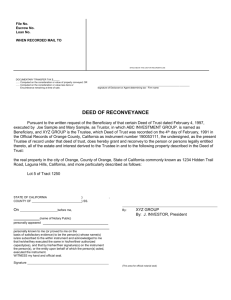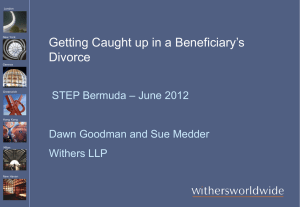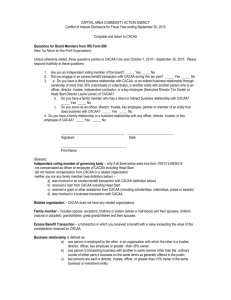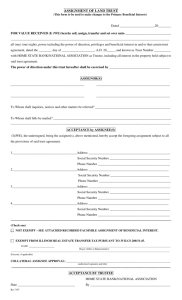Land Trust Overview
advertisement
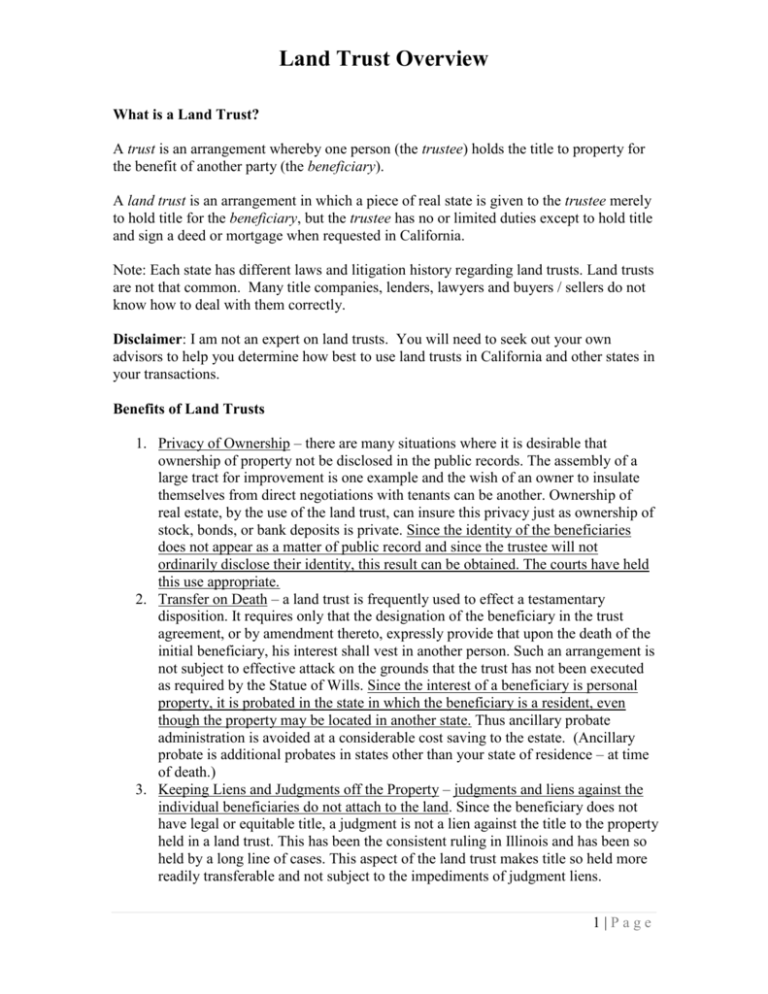
Land Trust Overview What is a Land Trust? A trust is an arrangement whereby one person (the trustee) holds the title to property for the benefit of another party (the beneficiary). A land trust is an arrangement in which a piece of real state is given to the trustee merely to hold title for the beneficiary, but the trustee has no or limited duties except to hold title and sign a deed or mortgage when requested in California. Note: Each state has different laws and litigation history regarding land trusts. Land trusts are not that common. Many title companies, lenders, lawyers and buyers / sellers do not know how to deal with them correctly. Disclaimer: I am not an expert on land trusts. You will need to seek out your own advisors to help you determine how best to use land trusts in California and other states in your transactions. Benefits of Land Trusts 1. Privacy of Ownership – there are many situations where it is desirable that ownership of property not be disclosed in the public records. The assembly of a large tract for improvement is one example and the wish of an owner to insulate themselves from direct negotiations with tenants can be another. Ownership of real estate, by the use of the land trust, can insure this privacy just as ownership of stock, bonds, or bank deposits is private. Since the identity of the beneficiaries does not appear as a matter of public record and since the trustee will not ordinarily disclose their identity, this result can be obtained. The courts have held this use appropriate. 2. Transfer on Death – a land trust is frequently used to effect a testamentary disposition. It requires only that the designation of the beneficiary in the trust agreement, or by amendment thereto, expressly provide that upon the death of the initial beneficiary, his interest shall vest in another person. Such an arrangement is not subject to effective attack on the grounds that the trust has not been executed as required by the Statue of Wills. Since the interest of a beneficiary is personal property, it is probated in the state in which the beneficiary is a resident, even though the property may be located in another state. Thus ancillary probate administration is avoided at a considerable cost saving to the estate. (Ancillary probate is additional probates in states other than your state of residence – at time of death.) 3. Keeping Liens and Judgments off the Property – judgments and liens against the individual beneficiaries do not attach to the land. Since the beneficiary does not have legal or equitable title, a judgment is not a lien against the title to the property held in a land trust. This has been the consistent ruling in Illinois and has been so held by a long line of cases. This aspect of the land trust makes title so held more readily transferable and not subject to the impediments of judgment liens. 1|Page 4. Avoiding Litigation – if it looks like the person has no assets, it is difficult for a disgruntled person to find a lawyer to take even a meritorious case. 5. Multiple Ownership – where ownership of land is shared by a number of persons, there is complexity in dealing with title to the land. Conveyances require the signatures of each owner and spousal right, such as homestead, require consideration. If some of the owners are non-residents of the State, these requirements increase the burden and the delays in concluding a transaction. Events affecting the personal lives of each owner can cloud the title held in their individual capacitates. Death, disability, divorce, bankruptcy, or litigation are some of the most frequently encountered circumstances which, if title is individually held, can attach to it and delay transactions involving the property. 6. Ease of Transferability of Interest – since interests in a land trust are personal property, in most states only a simple signature is needed for a transfer of ownership. The transfer is done with an Assignment of Beneficial Interest (ABI) and does not require any witness or notary. 7. Ease of Foreclosure – when beneficial interest is used as collateral in a mortgage, a collateral assignment of the beneficial interest is used, and a UCC-1 financing statement is used as security. Then the foreclosure is handled under Uniform Commercial Code (simpler procedure than a real state foreclosure). 8. Safer Lease/Option Agreements – use two parts, a tenant signs a regular lease of real property with the trustee and signs a separate option (“contract for option”) to buy the beneficial interest of the trust from the beneficiary. Easier to evict a tenant and not have to foreclose. 9. Keeping Sales Price Secret – transfer of beneficial interest need not be recorded. 10. Keeping Assessments Lower – Tax assessors or property appraisers watch for property sales to adjust that taxable value of the property. If beneficial interest is sold, public record of the transaction is not required. Be careful, this may not always be legal. 11. Avoiding Transfer Taxes – If keep same trustee, but ABI transfers to a new beneficiary, may not have to pay any type of transfer tax(?) Be careful. 12. Limited Liability – If foreclosed, no deficiency judgment can be entered against the trustee or the beneficiary, unless they signed the loan. 13. Saving Title Insurance Premiums – when property is sold it usually needs to have a new title insurance policy insuring the new deed. If selling the beneficial interest (ABI) and using same trustee, no new title insurance needed. 14. Buying Foreclosures – avoid mortgage lenders “due on sale clause” when a property is sold. Have original owner put property into a land trust, then assign the beneficial interest. In most cases you can keep the original mortgage. 15. Avoiding “Seasoning” Problems – “Seasoning” is the length of time a property has been owned. Some lenders refuse to make loans on properties which have not been owned for very long. Use a land trust, keep the same trustee, and assign the beneficial interest (ABI). 16. Spousal Rights – In states which have dower, curtsey, or Community Property rights, these can be avoided by the title being held in Trust. This is particularly useful where a dealer wants to move in and out of title without the need for the spouse’s signature on the conveyances. But trust can’t be used to defraud the spouse. 2|Page 17. Partition – where there is multiplicity of ownership, the conduct of one participant can frustrate the plans of all of the others. This is a result of the absolute right of a co-owner to resort to partition proceedings and thus precipitate a public sale of the property. The use of the land trust protects the title from this prospect of partition as it has no right of partition. 18. Assignable – the interest of the beneficiary under a land trust is personal property and unless restricted by the agreement of the parties, can be assigned by a simple assignment. This is a convenient aspect of the use of the land trust where a number of ownerships are created with fractional interests. It permits participation by numerous persons and the division of the beneficial interest among them. 19. Gifts – the beneficial interest in a land trust can be used for the purpose of making gifts. This is accomplished by a simple assignment lodged with and accepted by the land trustee. As in other gifts, there must be an irrevocable parting with ownership and present donative intent. 20. Sale Transactions – the sale of property held in a land trust can be completed by either a transfer of the title out of the land trust by a trustee’s deed, or by an assignment of the beneficial interest. In the latter case, the title to the property remains in the land trust trustee and the purchaser becomes the new beneficiary and can exercise all of the rights and powers of the trust. How a Land Trust Works Unique Features of a Land Trust Legal and equitable title are vested in the trustee Legal title – owner of property in official records of ownership. Equitable title – person who is really entitled to the property Beneficiary’s interest is personal property Reason – protect property from real state liens, etc. Trustee has no or limited duties except to sign deeds and mortgages Beneficiaries have all rights to possession and management Necessary Parties Beneficiary – person who owns the trust and controls the property Can be a person, corporation, partnership, limited partnership, limited liability company (LLC), trust, other legal entity or a combination of any of them. Trustee – natural person and in some states can be a corporation or LLC Optional Parties Successor Beneficiary – person who becomes owner and controls the property when the beneficiary dies Director - person who can direct the trustee to sell or mortgage the property without the beneficiaries’ direction (example, family trust, each member has interest, but you keep control of the trust). Sometimes used when a minor owns a property. Liability Trustee – not personally held liable for the debts, obligations, or liabilities of the trust unless provided for in the trust agreement or unless the trustee is in some way negligent. Liability is limited to the assets of the trust. Beneficiary – has the duty to manage the property in a typical land trust. The beneficiary also has the liability for mismanagement. 3|Page Wording of deed and land trust very important if trust gets involved in litigation Choosing the trustee – needs to be trustworthy!! Bank – fees may be unreasonable Lawyer – charge reasonable fees Relatives – good alternative (cheap), need to be able to trust them, avoid using the same last name as beneficiary Friends / close business associate – good alternative, need to be able to trust them Some states allow corporations / LLCs to serve as trustee Can use out-of-state trustee, lowers chance of litigation Obtaining Insurance Insurance agents confused: title in trustee name, liability and interest need to cover beneficiary One possible solution: issue policy in the name of the trustee (or trust?) “And the beneficiaries of the trust as their interests may appear”? Types of interests in land trusts Not a good idea to have multiple properties in one trust – one judgment goes against all properties in the trust. Sale and Mortgage Carry Back – a trust can sell the property and have the trust take back a mortgage on the property (only when the thing left in the trust is a mortgage) Other Interests in Land – land trusts are allowed to hold any type of interest in land such as leases, options, and mortgage. Notary and Witness Most states, there is no law requiring a notarization of a land trust Notarization is required for recording and sometimes for passing property at death Some states may also require witnesses for land trusts To be prudent – have two witnesses and a notary for your land trust unless you are sure that the law in your state does not require them Recording Record of deed Transfer tax Disclosure – form to fill out. You do not have to record the actual trust Financing Property in a Land Trust – Not easy to do with banks Mortgage / deed of trust of the real estate Mortgage documents signed by the trustee Promissory note signed by trustee An alternative is to pledge the beneficial interest as collateral for the loan Promissory note signed by trustee A conditional assignment of beneficial interest A chattel mortgage (a lien on personal property, not real estate) A UCC-1 financing statement under the Uniform Commercial Code Leasing the Premises 4|Page In most states, the trustee or beneficiaries can do this Lease must be drafted in the name of the party signing it Amending the Trust Beneficiaries can amend the trust at any time Usually takes effect when all beneficiaries have signed and trust is accepted by the trustee Most states don’t require notary or witnesses Use “Amendment to Trust” form Types of amendments Changing Successor Beneficiaries Changing trustees Assigning Beneficial Interest (ABI) Properties included in the trust can be changed Other amendments Termination of Trust Occurs when last piece of property has been conveyed out of the trust No special action or documentation is necessary Should not last more than a 20 years to avoid problems with the “Statue of Uses” Selling Land Trust Property (two ways) Trustee can deed the property out of the trust to the purchaser Trust either ends or can be kept to hold the mortgage or other properties Main documents needed: Contract for the Sale, deed from trustee and a direction of the trustee to sign the contract and deed from the beneficiaries Beneficiary can assign his beneficial interest in the trust to the purchaser (ABI) Buyer becomes the new owner of the trust Buyer can keep the same trustee or get a new one Main documents needed: Contract for Sale, Assignment of Beneficial Interest (ABI) by the beneficiary. Taxes A land trust does not file any federal or state tax returns. All taxable activities of the trust are reported on the returns of the beneficiaries. It is a “Transparent Trust.” Real Estate Taxes Bill sent to the trustee – the trustee is the recorded owner Drawback and Pitfalls Unfamiliarity in Marketplace People lacking experience with them might be afraid of them Lenders, insurance agents, title agents, and attorneys may be reluctant to work on a deal with them Uncertainty States where land trusts are not used often, may be some legal uncertainty about the status of your title If there is a legal problem, most likely you won’t lose the property or have to pay a penalty, you will likely need to sign some additional paperwork before the property can be transferred. 5|Page Costs Costs of setting up ($250 - $750?) and maintaining ($10 - $100/$250) the land trust Additional work by trustee typically billed at an hourly rate Trustee Choose a trustee you can TRUST! They have full power to sell your property and it would be hard to get it back One precaution: you can put a small mortgage ($1000) on the property in trust or record a “Memorandum of Option” to the beneficiary or relatives so the property can’t be sold or mortgaged without some notice to the beneficiary! Homestead exemptions In some states the owner of a property can get certain benefits if it used as a homestead (lower property taxes, exemptions from the claims of creditors, etc.) Use of a land trust may make it more difficult to get these benefits. Concerns for Trustees Fiduciary Obligations Liabilities Be sure property is adequately insured Be sure all trust documents state the trustee has no personal liability When signing different documents, use appropriate clause to limit personal liability ---- “As Trustee and Not Individually.” THIS IS A GENERAL OUTLINE OF THE BENEFITS AND USES OF A LAND TRUST. THIS IS NOT TO BE CONSIDERED AS LEGAL ADVICE. Dated: 14-Nov-08 Land Trust Overview 6|Page




